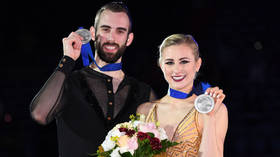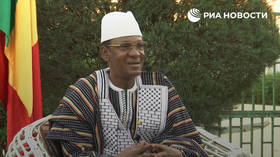US star to become first non-binary Winter Olympics athlete

American figure skater Timothy LeDuc will make history as the first non-binary athlete to appear at the Winter Olympics after being named by Team USA for the Beijing Games.
Alongside partner Ashley Cain-Gribble, LeDuc will take part in the pairs event after they qualified for the spectacle, which stars on February 4, by winning the US national championships held in Nashville last week.
Amid a diplomatic boycott of the Games by numerous governments including president Joe Biden's US administration, American athletes have often been accused of shying away from questions on alleged human rights abuses of Uyghur minority Muslims in China.
After receiving confirmation of their involvement in the competition, 31-year-old LeDuc was willing to engage on the issue.
"There's no simple answer to this question," LeDuc replied when he was asked whether athletes hold a responsibility to use their platform to speak out on the accusations.
"What I can say is we absolutely acknowledge the horrifying things that we've seen happening to the Uyghurs.
"I read somewhere the other day that it's the largest number of people held in internment and labor camps since World War II.
"I mean, these are horrifying human rights abuses that we're seeing happening. And it can feel very powerless when you read those things, because you think, 'What can I do?'"
In a brave stance, the Iowan also urged Americans to look closer to home rather than point the finger overseas.
"I think we're all probably people who believe human rights are for everyone. We all should have access to the same rights," they pointed out.
"So I see human rights being violated here, in my country. I see trans people fighting for human rights. I believe that healthcare is a human right and I see access to healthcare being denied. I believe abortion is healthcare and access to abortion is a human right.
"And I see those rights under attack in this country, and that's something we have control over here.
"So often, state and local governments are the ones who are restricting those rights, and we all have a responsibility and the ability to vote in those elections and elect people who are going to protect those human rights.
"So that's kind of how I think of it. I feel powerless sometimes, seeing the situation in China. I can use my voice here, yes.
"But what I can do here to defend human rights is be sure that I am vigilant and vote for the people in my local communities and state and local elections to defend human rights here as well."
Becoming the first openly gay man to win the US pair championships in 2019 with Cain-Gribble, LeDuc began using they/them pronouns last year.
They will make their maiden Olympics appearance as the winter edition's first non-binary athlete almost a year after Canada footballer Quinn became the first openly trans athlete and won gold in the women's football tournament at the Summer Olympics in Tokyo in 2021.
Alexa Knierim and Brandon Frazier will join LeDuc and Cain-Gribble in Beijing, but LeDuc said on Saturday how they hope "My hope is that when people see my story, it isn’t focused on me and saying, 'Oh, Timothy is the first out non-binary person to achieve this level of success in sport'," they said.
"My hope is that the narrative shifts more to: 'Queer people can be open and successful in sports.'
Two teams taking on the world. Introducing the pairs of the 2022 U.S. Olympic Figure Skating Team! 🇺🇸 pic.twitter.com/Oby2Kn9MrX
— Team USA (@TeamUSA) January 9, 2022
"We’ve always been here, we’ve always been a part of sports. We just haven’t always been able to be open.
"I know that me being here – and being able to be out now – is only possible because of the many great people who came before me.
"I stand on the shoulders of so many amazing queer people that have pushed their way through this sport, allowing me to be open now."












